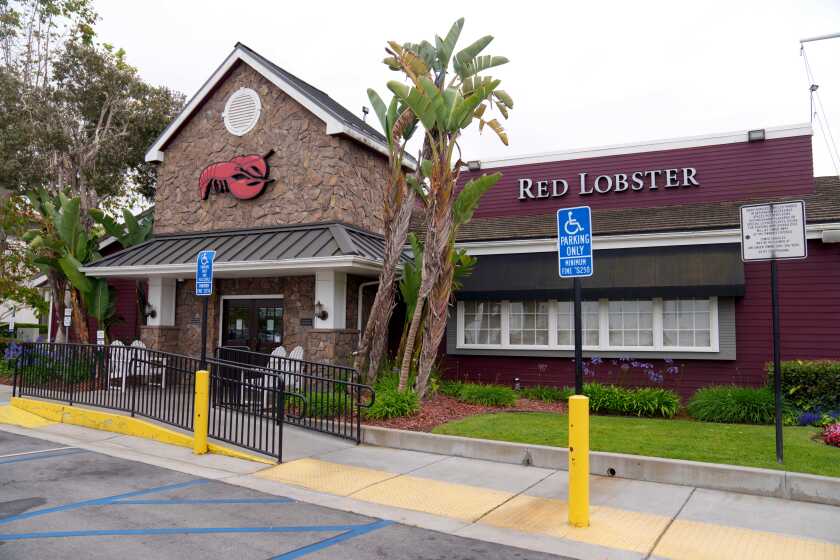Trading equity for some serenity
When Karen Cameron bought her 2,100-square-foot Camarillo tract house for $280,000 in 1988, she didn’t know it would help her semi-retire within 16 years. But at age 47, Cameron and her partner, Chuck Downs, also 47, were able to sell the house for $605,000 and are building a custom home on 10 acres in Bend, Ore.
Although Cameron says they will both eventually pursue some sort of part-time employment, the former human resources comptroller is now happily not working and enjoying the lifestyle change. Downs, a former graphic artist, plans to finish the house and then pursue his work as a mixed-media artist.
“Life is short,” Cameron said, “and you spend all these years saving and saving, and then who knows if you get the chance to enjoy it.”
In yet another twist on the benefits of homeownership, a growing number of longtime homeowners are cashing out of their Los Angeles-area homes and using the equity to retire early or partially, or to enhance their retirement plans in less expensive areas.
“People are not necessarily waiting to retire, and retirement doesn’t mean not working. They are looking around at the housing market, and with Social Security being unsure, they are realizing in their late 40s and early 50s that it can be easier to pay off the house and move to a less expensive area,” said Karen Krasner, a Coldwell Banker agent in Ventura. “Any home that will sell in the $500,000 range can be used to help retire if you’re going to places like Texas, Oregon, Washington and Montana.”
Traditionally, longtime homeowners would not consider using their home equity as part of their retirement plans, said Nathan Booth, senior advisor for the Senior Advantage Real Estate Council, a division of the California Assn. of Realtors. They would pay off their mortgages and hold on to their houses.
But with median home prices in California escalating up to 22% a year over the last several years, the real estate market has allowed longtime homeowners to use their equity in new ways.
“A number of them are baby boomers who wanted to retire early based on their stock portfolios. But after losing an average of one-third of their savings, many pulled their money out of the market and into real estate,” said Booth, who runs training programs for senior-specialist Realtors. Booth has found that more real estate agents are focusing on seniors as their homes continue to gain in value and as investment-savvy baby boomers start to make retirement plans.
In part, the trend is due to the “redefining of retirement in America,” according to Sara Rix, senior policy advisor for AARP. “There are a lot of data that suggest retirement is different today. Because older people are healthier and better educated now, they have more options and more opportunities.”
Many, Rix said, are phasing into retirement by scaling back their work hours but plan to continue working in some capacity past age 65, enabling them to pay a larger mortgage for a longer time.
“Now [the baby boomers] are at the stage where they want mobility and freedom,” she said. “They feel they’ve put in their time and want to change their lifestyle.”
Some of these homeowners, like Cameron and Downs, are opting out of the urban rat race altogether and exploring new, less expensive frontiers in areas such as Idaho, Washington and Arizona.
“We’re really into the outdoors and the environment, and it’s all here,” Cameron said. “You don’t have to struggle to get on the freeway or make reservations just to go somewhere.”
To buy the land and build a house in Oregon cost about $600,000, she said, comparable to the selling price of their Los Angeles-area home.
In a variation on the trend, others are purchasing or enhancing second homes in places like Palm Desert. In many cases, retirement experts and realty agents say, they are trading up to bigger houses with the full complement of amenities.
Bob Horne, a broker associate for Coldwell Banker in Palm Springs, said that he’s seen a 20% to 25% increase in the number of under-65 home buyers over the last few years. Most, he said, are shopping for second homes into which they eventually plan to move permanently. In addition, he said, they are much more affluent and investment-savvy than the previous generation of home buyers.
“More of them want larger and larger houses. You’d think they would be downsizing at this point, but not anymore,” Horne said. “They used to want 2,400 square feet, tops. Now they are looking for houses in the 3,000-square-foot range.”
This, too, is a departure from past retirement patterns.
“What used to be retirement is not quite like that,” said Steve Goddard, a Re/Max Realtor, broker and manager based in Manhattan Beach. “People don’t quit, they just slow down.”
For Jon Richetti, a 75-year-old retiree, the appreciation in his San Diego triplex allowed him to sell that investment property and buy a second home near Palm Desert that he’ll also use as a rental. “I bought it 32 years ago for $32,000, and within four days on the market it sold for $790,000,” Richetti said.
To preserve their gains, the couple made an Internal Revenue Code 1031 tax-deferred exchange. This way, they delay paying capital gains tax on the profit they made from the sale of the triplex. They won’t have to pay capital gains tax until they later sell the rental house they bought with the proceeds.
When he and his wife, Kristen, 54, retire in two years, they plan to sell their primary San Diego residence and use the proceeds to enhance a permanent move to the desert. In the meantime, they will alternate between renting out the Palm Desert house and spending vacation time there.
“The benefits are that it’s a new house, and we don’t have to fix it up anymore or be at the beck and call of tenants. We now have a management company handling that,” he said. “And although we plan to use the house for six or seven months a year and won’t make as much income from it, we may use it for our retirement.”
But one concern that Cameron and others expressed involves the prospect of never being able to afford their old neighborhood.
“We thought about keeping the house in Camarillo and just renting for a while,” she said, “because if houses keep appreciating, we may never be able to come back.”
*
Jennifer Lisle can be reached by e-mail at jenlisle1119@aol.com.






